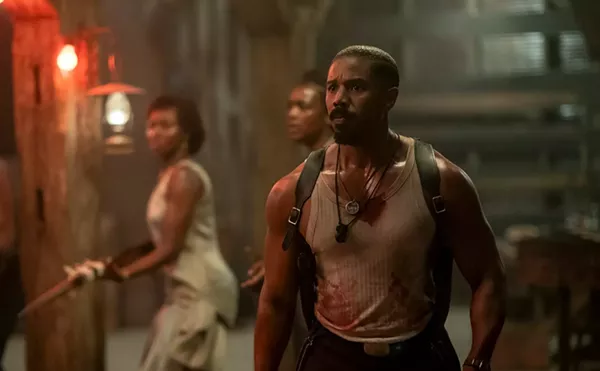
Audio By Carbonatix
[
{
"name": "GPT - Leaderboard - Inline - Content",
"component": "35519556",
"insertPoint": "5th",
"startingPoint": "3",
"requiredCountToDisplay": "3",
"maxInsertions": 100,
"adList": [
{
"adPreset": "LeaderboardInline"
}
]
}
]
What’s the deal with Zhang Yimou? When he first came to attention in the West in the early ’90s, the Chinese director established himself as a creator of visually sumptuous historical dramas (Raise the Red Lantern, Ju Dou) built around his muse, the actress Gong Li. Later he scaled down his vision to a neorealist level (Not One Less, The Road Home), making films with a social critique aspect that ensured an uneasy relationship with his country’s authorities. But with last year’s Hero and now House of Flying Daggers, he’s now become the latest martial arts visionary on the international art-house circuit.
The film is set in 859 A.D., toward the end of the Tang dynasty. If that doesn’t ring a bell, not to worry; it could just as easily be set on the planet Xantex in the year 5000. The Flying Daggers of the title is a clandestine group of assassins fighting an evil and corrupt government. Our hero is the undercover cop Jin (Takeshi Kaneshiro), who has befriended Mei (Zhang Ziyi), who is posing as a blind courtesan but is actually a member of the Dagger underground. Jin’s job is to infiltrate the Daggers, but when both he and his boss Leo (Andy Lau Tak Wah) fall heavy for the beautiful but deadly Mei, complications arise.
It’s a comic book plot, but the action is the meat of this genre, the ballet-like, gravity-defying and supernaturally acrobatic fight scenes that are still fun but quickly becoming too familiar. It’s hard to say if Zhang’s artistic journey from historical-political dramas to social critiques to these action-fantasy films is a retreat, an advance or a sideways move. He’s obviously in a more secure position in his homeland, making these kinds of films instead of ones that could be interpreted as critical of his government. Yet Zhang’s films have always been pictorially impressive and one can see how the potential of computer-enhanced imagery would fire his already keenly visual imagination.
The plot of Daggers is marginally easier to follow than was that of Hero, mainly because it’s basically a buddy movie where two guys are in love with the same girl, and you know the only resolution is for at least one of the trio to die. There are a couple of nice, if unsurprising, plot turns, spelled out quite clearly. The political situation is a back-story device meant to set the action, so what scant details we get hardly matter. The love story is operatic; just as music can make a melodrama seem sublime, Zhang’s unrelentingly beautiful color palette and graceful action sequences heighten the impact of what would otherwise be a posturing romance. It’s a visual feast and, like most feasts, you might leave the table sated but with an eye toward a somewhat more stringent diet in the immediate future.
In Mandarin with English subtitles. Showing at the Main Art Theatre (118 N. Main St., Royal Oak); 248-263-2111.
Richard C. Walls writes about film for Metro Times. E-mail letters@metrotimes.com.





